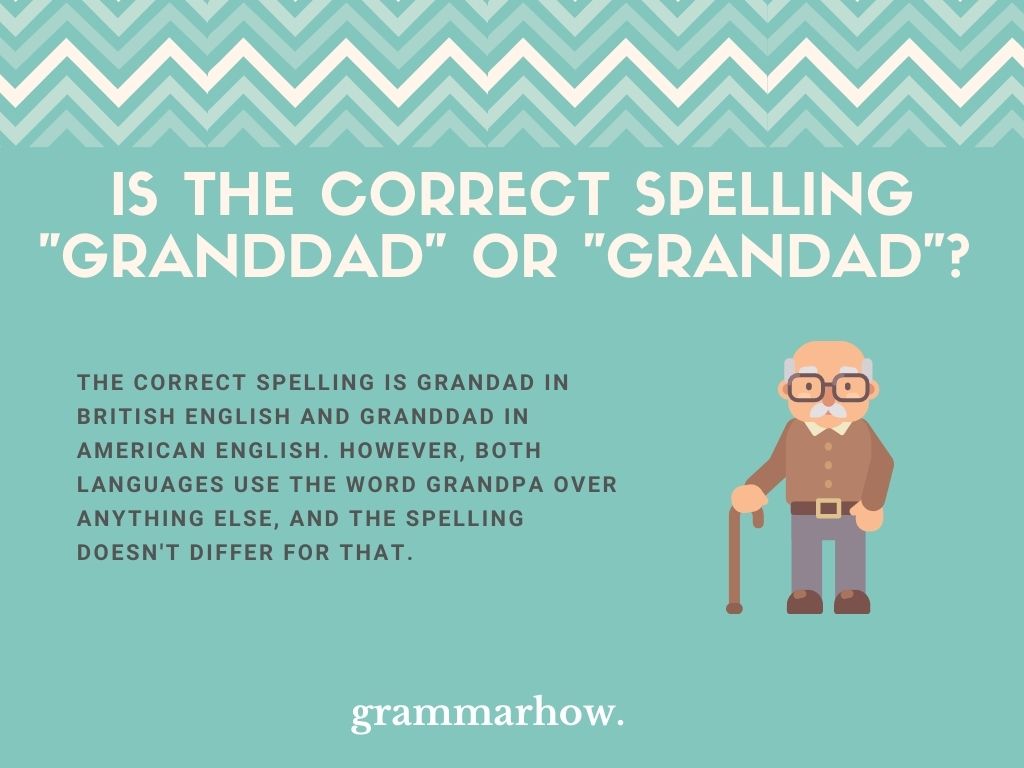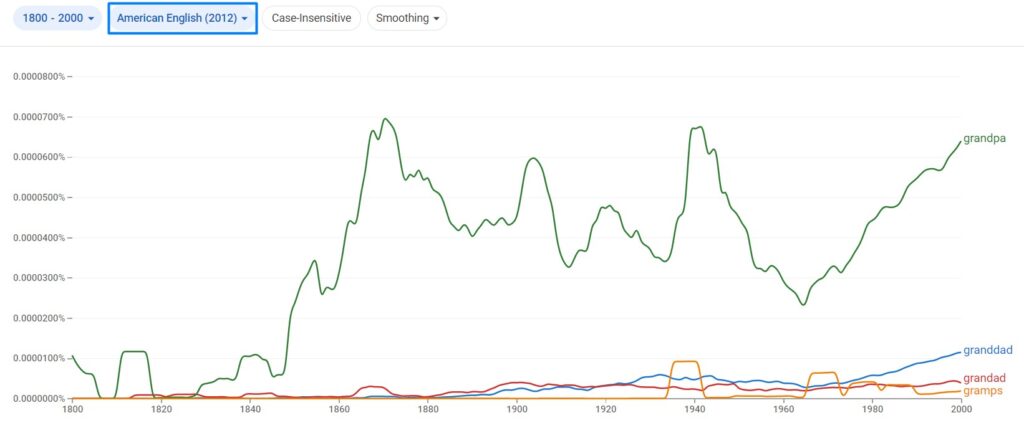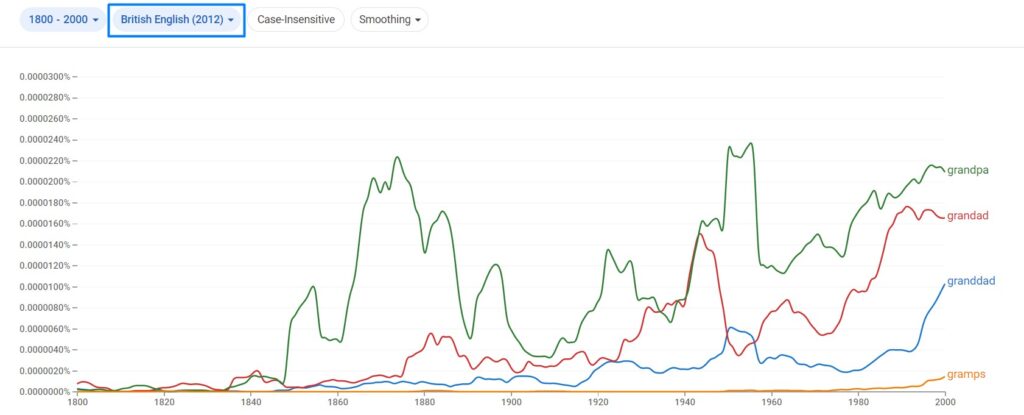How many “D’s” are there in grandad, we hear you ask? Thankfully, we’ve got all the information you possibly need to help you get to the bottom of the answer!
Is The Correct Spelling Granddad Or Grandad?
The correct spelling is grandad in British English and granddad in American English. However, both languages use the word grandpa over anything else, and the spelling doesn’t differ for that.

If we refer to the graphs that we’ve got here, we can see how the spellings differ based on what country you’re from.


American English shows that granddad with two D’s is the most popular spelling of the two variations. However, the most popular choice overall in American English is actually grandpa.
The same goes for British English, where grandad with only one D is the most popular spelling. Granddad with two D’s is also acceptable, but grandpa is still the most popular spelling of the group in British English.
According to the Cambridge English Dictionary, both spellings of grandad are correct, no matter what country you are from. British English prefers the “grandad” spelling, while American English prefers the “granddad” spelling.
If I Am From Neither US Or UK – How Should I Spell It?
If you’re from neither of the main countries that use American English or British English, then you might be asking yourself which one you should use! When we look at other countries in the world learning English, they typically follow the British English rules.
That means that you should probably use “grandad” as the acceptable spelling if you’re learning English. This will work the best for you and will be able to be used across a more global audience.
However, if you work with people from America more often than anywhere else in the world, then it might be good to learn the US variation, granddad.
Either way, it’s up to you which spelling you prefer. Since both are correct, you can’t go wrong with either one. It mostly depends on where you are in the world or who you speak to as to which is the more acceptable spelling.
Does The Spelling Rule Also Count For Granddaddy Or Grandaddy?
Some people like to refer to their male grandparents as grandaddy or granddaddy. If this is the case for you, you might want to know the rules associated with spelling them.
Granddaddy and grandaddy are both correct. You should use the spelling variation that most closely resembles your choice of granddad or grandad.
Since the word only adds an extra “-dy” to the end of it, the spelling rules don’t change all that much. You can use them both however you want. It’s worth mentioning that “granddaddy” is seen as a more informal spelling (that goes for both spellings of it). If you use a word like granddaddy in formal situations, then you may be mocked.
Is It Also Correct To Spell It Grand-Dad (With A Hyphen)?
There is also a case to be made for “grand-dad,” where we spell it with a hyphen. This isn’t one of the most common variations, and most people don’t enjoy writing it because the hyphen adds an extra element to the spelling that’s otherwise unnecessary.
If you use grand-dad yourself, though, then there’s nothing wrong with spelling it that way. It still means the same thing and works just as well.
Since we’re referring to our grandparent, the prefix becomes “grand,” which says that this person is one familial level higher than our own parents. We then separate the word that comes after it with a hyphen, and since the grandparent is male, that word has to be “dad.” That is why “grand-dad” is also an acceptable way to spell it.
Is There A Difference Between Grandad And Grandpa?
There is no significant difference between saying grandad or grandpa. The only difference comes down to personal preference. As you saw from the graph above, most of the world prefers using “grandpa” over “grandad,” so it’s the more globally acceptable one.
Grandpa may be seen as slightly more formal or upper class, while grandad is more casual and friendly. You can ask your grandparents which term they prefer and see for yourself.
However, both words mean our grandfather figure (either our mother’s or our father’s father). You can use whichever spelling you think looks best to you. Some grandparents even have their preferences. For example, some grandads might prefer to be known as grandpa, while others prefer a more colloquial grandad.
Granpa Vs. Grandpa
When we’re writing “grandpa,” some people think removing the D to turn it into “granpa” is okay. However, this is not the case, and you should avoid doing this.
“Granpa” is not grammatically correct, as it doesn’t show that the parental figure is “grand” to us. If we remove the D from the word “grand,” we’re left with an incorrect meaning and can no longer use it in the same manner.
Saying “grandpa” sounds like “granpa” because many people rush the D when they say it aloud. If you think you might have heard someone say “granpa,” chances are you probably misheard it, and they said “grandpa” instead. Ask them to spell it for you to see what they meant.
Grandfather Vs. Granfather
The same rules we mentioned above are applied when looking at “grandfather.”
“Grandfather” is the most formal way to talk about your mother’s or father’s father. It’s used when you have a conservative family or an upper-class family that likes to use the word.
However, just like saying “grandpa” incorrectly, if we remove the D from “grandfather,” we’re left with an incorrect variant spelling. You can’t write “granfather” in any case because it will never be correct.
The same thing goes for what we said about “grandpa” above. When people say “grandfather,” the smooth transition between the D and the F leads to the D sounding silent. This might make you think that the spelling is “granfather,” but this is not the case. Again, ask them to clarify their spelling if you believe they said it wrong because it should always include the D in it.

Martin holds a Master’s degree in Finance and International Business. He has six years of experience in professional communication with clients, executives, and colleagues. Furthermore, he has teaching experience from Aarhus University. Martin has been featured as an expert in communication and teaching on Forbes and Shopify. Read more about Martin here.
